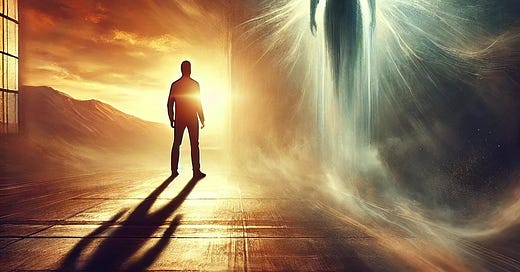Season of Self: Reclaiming Power, The Shadow as a Source of Strength
The power we were taught to fear is the power that will set us free. It was never lost—only buried. This is the journey of reclaiming what has always been ours.
The Power That Had to Be Forged
For most of my life, I believed that power had to be forged. That it wasn’t something you simply had, it was something you took—something you fought for. That the world didn’t allow access to the weak, and that to be weak or vulnerable was a sure path to death in one way or another.
So, I became bold, loud, aggressive—all the things patriarchy demands of those it deems “men” or “leaders.” I watched how the world moved, and I adjusted. If the world rewarded strength, then I would be unshakable. If the world respected men more, then I would adopt the power traits society assigned to them.
Being raised by a Bronx Irish first-generation family wasn’t for the weak, nor was the city I was coming up in. I learned early on that power perceived is power achieved.
And for a while, that worked.
Until it didn’t.
Because what I failed to see then—but what I now know—is that patriarchy doesn’t just harm women. It kills men first. It turns power into a game of domination instead of sovereignty. It strips everyone of the ability to be whole.
For men, power becomes a cage—one that forces them to suppress their emotions, to push through pain, to conflate control with respect.
For women, power becomes a punishment—one that teaches us to shrink, to defer, to prove ourselves over and over, but never be too much.
I learned that firsthand when I became a military wife.
I had already been performing power the way patriarchy demanded of men, but when I stepped into the role of a “military wife,” I was expected to be something I never wanted to be. Soft, submissive, adaptable, in service of a man.
I tried. I failed. I suffocated.
The demise of my first marriage was one of the first moments of truth that forced me to reckon with what I believed about power. And as I moved through multiple transitions of self—school mom, church mom, just mom, and then finally, just me—I began to realize something that changed me forever:
Power doesn’t need to be displayed. It doesn’t need to be taken. It doesn’t need to be proved.
Power is intrinsic. It is inevitable. It simply is—when given space to exist.
This was the first step in reclaiming my power: Recognizing that I never lost it—it was just buried beneath all the things I was told I needed to be.
And that? That was just the beginning.
"If I could be conditioned to fear my own power, then how many of us have been taught the same lie? And if reclaiming power is part of my healing, then it must also be part of our collective healing."
When I Stopped Performing and Started Owning My Power
There was a moment—one I didn’t recognize as significant at the time—that I now see as the shift. It wasn’t a loud declaration or a battle won. It wasn’t something external at all. It was something that happened inside me, quietly but irrevocably.
I was sitting alone, not after some great triumph, but after what felt like yet another loss. The weight of expectations, failures, and doubts sat heavy on my chest. But instead of doing what I had always done—trying to strategize, trying to push through, trying to prove myself—I just sat.
I let the discomfort rise. I let the fear of failure, the fear of being alone, the fear of never being “enough” sit next to me. And I did something I had never done before:
I didn’t try to fix it. I didn’t try to prove anything.
I simply let myself be.
And in that moment, I felt something shift—not outwardly, but deep in my bones.
I wasn’t powerless. I never had been.
I had spent so much time proving my power that I had forgotten what it felt like to just own it. To know that it was mine, with or without validation. To trust that I did not need to fight to be worthy of it.
That was the moment my power became something I carried inside me, not something I needed others to recognize.
That was the moment I stopped performing power and started embodying it.
The Power We’ve Been Taught to Fear
For so many of us, power is a complicated thing. We have been conditioned to see it as something external—something granted to others, something taken from us, something corruptible or dangerous. Supremacy culture has taught us to fear our own power because a fully realized, self-possessed person is harder to control.
The truth is, we were never powerless. But the parts of us that held power—our confidence, our voice, our intuition, our ability to say no—were often silenced, dismissed, or shamed. And so, we buried them deep in our shadow, believing them to be flaws rather than strengths.
But the shadow does not swallow our power—it preserves it. It keeps it safe until we are ready to reclaim it.
This is the work of today: to look into the shadow and find not just what was hidden, but what is waiting to return to us.




